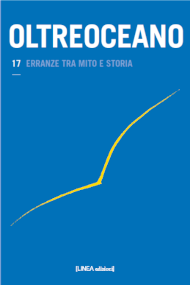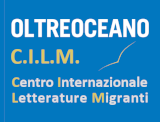Dall’erranza epica alla migrazione etica. Il worlding della letteratura americana
DOI:
https://doi.org/10.53154/Oltreoceano8Parole chiave:
migration, translational American literature, world literatureAbstract
Questo saggio analizza il processo di worlding della letteratura americana, attualmente in atto, mettendo in luce come esso riscriva la migrazione che, da evento mitopoietico, funzionale alla definizione del carattere nazionale – come è stato dai Padri pellegrini al western fino alla letteratura etnica del Novecento – diventa occasione per un nuovo apprezzamento in senso etico delle globalità.
The Worlding of American Literature: From Mythic Wandering to Ethic Migration
This essay analyzes how the depiction of migration changes in some American texts of the 21th century, passing from the past epic dimension of the Pilgrim Fathers, the western or the ethnic narratives of the 20th century, to the ethic element of the so-called World Literature.
Downloads
Riferimenti bibliografici
Abani, C. (2014): The Secret History of Las Vegas. New York: Penguin.
Alvarez, J. (2010): How the Garcia Girls Lost Their Accents (1991). Chapel Hill: Algonquin Books.
Anaya, R. (1994). Bless Me, Ultima (1975). New York, Grand Central Publishing.
Antin, M. (1912): The Promised Land. Boston: Houghton Mifflin.
Antin, M. (1914): They Who Knock at Our Gates. Boston: Houghton Mifflin.
Bulawayo, N. (2013): We Need New Names. London: Vintage.
Cahan, A. (1985): Perduti in America. Trad. di M. Maffi. Milano: SugarCo.
Cahan, A. (1987): Lo sposo importato Trad. di M. Maffi.. Milano: Sugar-Co.
Cahan, A. (2019): L’ascesa di Levinsky. Trad. di L. Crescenzi &S. Zamagni. Fidenza: Mattioli.
Carpio, G. (2014): Contemporary American Immigrant Literature. RSA Journal, 23, pp. 54- 72.
Casanova, P. (2004): The World Republic of Letters. Cambridge and London: Harvard University Press.
Chandra, S. (2008): Re-Producing a Nationalist Literature in the Age of Globalization: Reading (Im)migration in Julia Alvarez’s How the Garcia Girls Lost their Accents. American Quarterly, 60, 3, pp. 829-850.
Cisneros, S. (2004): The House on Mango Street. London: Bloomsbury.
Concilio, C. (2018): We Need New Names by N. Bulawayo. Paradigms of Migration: The Flight and the Fall. Le simplegadi, 16, pp. 34-51.
Damrosh, D. (2003): What Is World Literature? Princeton and Oxford: Princeton University Press.
Danticat, E. (2000): The Farming of Bones. London: Abacus.
Deresiewicz, W. Fuku Americanus (2007/09/08): The Nation. Recuperato da https://www.thenation. com/article/archive/fukuacute-americanus/
Diaz, J. (2008): La breve favolosa vita di Oscar Wao. Trad. di Silvia Pareschi. Milano: Mondadori.
Dimock, W.C. (2007): Introduction: Planet and America: Set and Subset. In W.C. Dimock & L. Buell (Eds.), Shades of the Planet: American Literature as World Literature (pp. 1-16). Princeton: Princeton University Press.
Elias, A. J. & Moraru, C. (Eds.) (2015): The Planetary Turn: Relationality and Geoaesthetics in the Twenty-First Century. Evanston: Northwestern University Press.
Eggers, D. (2006): What Is the What. San Francisco: McSweeney’s.
Fante, J. (2005): The Brotherhood of the Grape. Edinburgh: Canongate.
Giles, P. (2007): The Deterritorialization of American Literature. In W. C. Dimock and Lawrence Buell (Eds.), Shades of the Planet: American Literature as World Literature (pp. 39-61). Princeton: Princeton University Press.
Goyal, Y. (2017): We Need New Diasporas. American Literary History, 29, 4, pp. 640-663.
Irr, C. (2014): The Geopolitical Novel: U. S. Fiction in the 21st Century. New York: Columbia University Press.
Irr, C. (2011): Toward the World Novel: Genre Shifts in 21st-Century Expatriate Fiction. American Literary History, 23, 3, pp. 660-679.
Lazarus, E. (1883): The New Colossus. Recuperato da https://www.poetryfoundation.org/poems/46550/the-new-colossus
Lopate, P. Immigrant Fiction: Exploring an American Identity. In The Gilder Lehrman Institute of American History. Recuperato da https://ap.gilderlehrman.org/history-by-era/literature-and-language-arts/essays/immigrant-fiction-exploring-american-identity
Núñez Cabeza de Vaca, A. (2001): La relación / The Account (1542). Houston: Arte Publico Press.
Robbins, B. (2011): The Worlding of the American Novel. In L. Cassuto, C. Virginia & B. Reiss (Eds.), The Cambridge History of the American Novel (pp. 1097-1107). Cambridge: Cambridge University Press.
Schultz, K. (2013/06/03): Review of Americanah by Chimamanda Ngozi Adichie. New York Magazine. Recuperato da https://www.vulture.com/2013/05/schulz-on-americanah-by-chimamanda-ngozi-adichie.html
Sollors, W. (1986): Beyond Ethnicity: Consent and Descent in American Literature. Oxford: Oxford University Press.
Yau, J. (1995): How to Become Chinese. in Yau, J. Hawaiian Cowboys (pp. 113-123). Santa Rosa (CA): Black Sparrow Press.
Yezierska, A. (2003): Bread Givers (1925). New York: Persea Books.
Yezierska, A. (1920): Hungry Hearts. Boston: Houghton Mifflin.
Yezierska, A. (1923): America and I. Recuperato da https://www.commonlit.org/texts/america-and-i
Downloads
Pubblicato
Come citare
Fascicolo
Sezione
Licenza

Questo lavoro è fornito con la licenza Creative Commons Attribuzione - Non commerciale - Condividi allo stesso modo 4.0 Internazionale.
Gli autori si impegnano a rispettare le seguenti condizioni, che s’intendono accettate al momento della sottomissione per la stampa dei propri contributi.
L’invio di un testo implica che esso sia inedito e non in attesa di essere pubblicato altrove.Gli autori si impegnano a rispettare le seguenti condizioni, che s’intendono accettate al momento della sottomissione per la stampa dei propri contributi.
- Qualora venga accettato, l’autore conferisce all’editore il diritto di pubblicarlo e distribuirlo sia in forma cartacea che nell’edizione elettronica in rete. Gli articoli pubblicati saranno scaricabili e resi disponibili in open access.
- Purché segnali correttamente che la prima pubblicazione è avvenuta sulla rivista «Oltreoceano. Rivista sulle migrazioni», l’autore ha facoltà di: a) riprodurre l’articolo in estratti separati o raccolti in volume; b) pubblicare l’articolo nel proprio sito personale o in quello di corsi di insegnamento purché si tratti di siti di natura non commerciale; c) depositare l’articolo in archivi online di carattere non commerciale, legati all’istituzione di appartenenza o come parte di progetti di diffusione non commerciale e open access dei lavori scientifici.
Non è consentita l’utilizzazione dei contributi da parte di terzi, per fini commerciali o comunque non autorizzati. L’editore declina ogni responsabilità sull’uso non autorizzato del materiale pubblicato sulla rivista.













